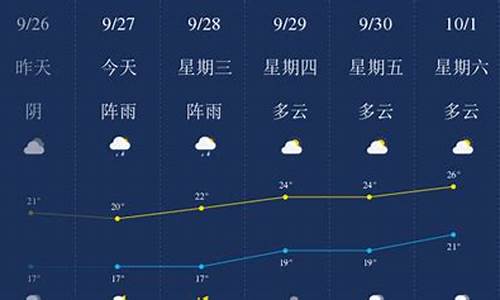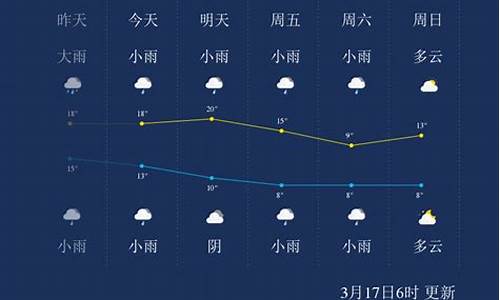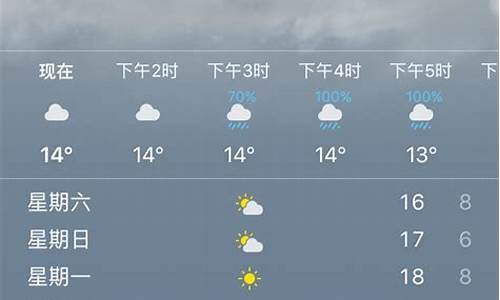1.关于天气的英语作文
2.如何用英语形容天气状况
关于天气的英语作文

The weather is a set of all the phenomena in a given atmosphere at a given time. It also includes interactions with the hydrosphere. The term usually refers to the activity of these phenomena over short periods (hours or days), as opposed to the term climate, which refers to the average atmospheric conditions over longer periods of time. When used without qualification, "weather" is understood to be the weather of Earth.
Weather most often results from temperature differences from one place to another. On large scales, temperature differences occur because areas closer to the equator receive more energy per unit area from the Sun than do regions closer to the poles. On local scales, temperature differences can occur because different surfaces (such as oceans, forests, ice sheets, or man-made objects) have differing physical characteristics such as reflectivity, roughness, or moisture content.
Surface temperature differences in turn cause pressure differences. A hot surface heats the air above it and the air expands, lowering the air pressure. The resulting horizontal pressure gradient accelerates the air from high to low pressure, creating wind, and Earth's rotation then causes curvature of the flow via the Coriolis effect. The simple systems thus formed can then display emergent behaviour to produce more complex systems and thus other weather phenomena. Large scale examples include the Hadley cell while a smaller scale example would be coastal breezes.
The strong temperature contrast between polar and tropical air gives rise to the jet stream. Most weather systems in the mid-latitudes are caused by instabilities of the jet stream flow (see baroclinity). Weather systems in the tropics are caused by different processes, such as monsoons or organized thunderstorm systems.
Because the Earth's axis is tilted relative to its orbital plane, sunlight is incident at different angles at different times of the year. In June the Northern Hemisphere is tilted towards the sun, so at any given Northern Hemisphere latitude sunlight falls more directly on that spot than in December (see Effect of sun angle on climate). This effect causes seasons. Over thousands to hundreds of thousands of years, changes in Earth's orbital parameters affect the amount and distribution of solar energy received by the Earth and influence long-term climate (see Milankovitch cycles).
On Earth, common weather phenomena include such things as wind, cloud, rain, snow, fog and dust storms. Less common events include natural disasters such as tornadoes, hurricanes and ice storms. Almost all familiar weather phenomena occur in the troposphere (the lower part of the atmosphere). Weather does occur in the stratosphere and can affect weather lower down in the troposphere, but the exact mechanisms are poorly understood.[1]
The atmosphere is a chaotic system, so small changes to one part of the system can grow to have large effects on the system as a whole. This makes it difficult to accurately predict weather more than a few days in advance, though weather forecasters are continually working to extend this limit through the scientific study of weather, meteorology. It is theoretically impossible to make useful day-to-day predictions more than about two weeks ahead, imposing an upper limit to potential for improved prediction skill.[1] Chaos theory says that the slightest variation in the motion of the ground can grow with time. This idea is sometimes called the butterfly effect, from the idea that the motions caused by the flapping wings of a butterfly eventually could produce marked changes in the state of the atmosphere. Because of this sensitivity to small changes it will never be possible to make perfect forecasts, although there still is much potential for improvement.
The sun and oceans can also affect the weather of land. If the sun heats up ocean waters for a period of time, water can evaporate. Once evaporated into the air, the moisture can spread throughout nearby land, thus making it cooler.
这应该差不多了。
~~@~~
如何用英语形容天气状况
外面的天气如何? 要问别人外面的天气如何, 最简单的问法就是, "What's the weather like out there?" 或是我们可以用一个很简单的 it 来代表天气, 像是 "What's it like out there?" 这样讲也可以. 还有要是你不喜欢用 What 来作问句, 你也可以简单地说, "How is the weather out there?" 但是如果我们想问别人未来的某一个时间会不会出太阳或是会不会下雨, 例如我想问人家星期一会下雨吗? 像这种情况我们就可以说, "Is it supposed to rain on Monday?" 这里用到了一个 be suppose to 的片语, 这种讲法是老美最喜欢的. 再比方说吧, 如果我们假设明天有什么活动, 我们常常会要求别人先看看明天会不会出太阳或下雨, 这种情况老美他们会说, "Why don't you check and see if it's sunny tomorrow?" (你何不看看明天会不会出太阳呢?) 这里把 see if it's sunny 改成 see if it's going to rain 就变成了看看会不会下雨. 2. It's a beautiful day. 今天天气很好. 老美都是怎么形容天气很好的呢? 通常他们会用 beautiful, nice 或是 lovely 来形容. 其中我最常听到的就是, "It's a beautiful/nice/lovely day." 反之如果是天气很糟下大雨呢? 你可以用 "It's nasty." 来形容. 但是有时候也可以用反讽的讲法. 有一次外头下著倾盆大雨, 我和一个美国同学又正好没带伞. 结果她居然说, "How lovely." (天气可真是好啊.) 当时我还正经八百地问她是否天气很差可以用 lovely 来形容, 后来我才知道原来她只不过是在讲反话, 害我有点受骗的感觉. 3. It rained cats and dogs last night. 昨晚雨下得很大. Rain cats and dogs 是一句非常受欢迎的俚语啦, 几乎每个在美国的外籍学生都懂得用 rain cats and dogs 来形容雨下得很大. 当然如果你不想用俚语的讲法, 你可以单说, "It's raining really hard." (雨下得很大) 或是, "We're having a heavy rain." 同样也是雨下得很大. 那雨下得很大, 我被淋成了「落汤鸡」这整句话要怎么讲? 落汤鸡在英文里只能用 "I am soaked." (我湿透了) 来形容, 所以整句话就成为. "It's raining cats and dogs out there so I am soaked." 4. We had a downpour. 我们刚遇到了一场倾盆大雨. 中文里常形容下雨像是用「倒」的一样, 这在英文里也有同样对等的字眼喔! 英文里用的是 downpour 这个字. 形容下雨像是用倒的一样 (pour 单独解就是倒水的意思). 所以下雨像是用倒的我们可以说, "We had a downpour." 另外有一个十分口语的讲法, "It's really coming down out there." 也是形容雨下得很大, 像是用「倒」的一样. 5. It's just sprinkling. 只是在下毛毛雨而已. 在英文里不管下毛毛雨或是毛毛雪我们都可以用 drizzle 和 sprinkle 这两个动词来表示. Drizzle 这个字就是气象术语里「下毛毛雨」的意思. 而 sprinkle 则是一个动词表示「撒」, 但也常被用来形容毛毛雨, 常听到的用法就是, "It's drizzling." 或是 "It's sprinkling." 另外还有一个字叫 scattered rain. 指的则是零零星星地降雨. 例如, "We have to cancel the track and field contest because of the scattered rain." (因为零星的降雨所以我们必须取消田径赛. ) 6. You need to put on your sweater because it's freezing. 你必须穿上你的毛衣因为外面很冷. 形容天气冷有几个形容词可以使用, chilly 指的是天气有点「凉」, cold 指的是「冷」, 而 freezing 指的则是「冻」. 除了 freezing 之外, 我室友还教我一个俚语, "It's colder than a witch's titty." 也可以形容天气很冷, (还可以形容不友善 unfriendly ) 不过我想这不是什么好话, 因为当时他女朋友一直试图要阻止他教我这一句俚语. 至于各种冷的程度完全视个人而定, 像我可能觉得摄氏五度以下就算是 freezing 了, 可是你相不相信, 这种温度时还有老美穿著 T 恤在校园里走来走去呢! 我想他们觉得这种温度只是 chilly 吧! 不过严格上说起来, 只有摄氏零度以下才能说是 freezing. 因为 freeze 是指液体凝结成固体, 而 freezing point 则是指「冰点」.水的冰点是摄氏零度, 所以照理说零度以下才能算是 freezing 啦! 不过平常何时使用 freezing 则是看个人的感受而定了, 不需严格去界定. Bonus: 温度零度是用 zero degrees, 而非 zero degree. 许多人常犯这个错误. 7. It's burning up out there. 外面热得跟火炉似的. 以前还没来美国之前常以为美国的冬天比较冷, 所以夏天一定比较不热. 后来我才知道真是大错特错. 美国东岸夏天的温度有时会超过华氏 100 度, (相当于摄氏 37.8 度), 在这种高温下人体不能自然散热, 简直就像是火炉一样. 在英文里要形容天气像「火炉」一样, 我们可以说, "It's burning up out there." 另外我们也可以说热得跟地狱一样, "It's hot as hell." 或是意思一样, 俚语的讲法, "It's hot as Hades." 这个 Hades 在这里也是指地狱 (hell) 的意思. 8. We can't play tennis today because It's too windy. 我们今天不能打网球因为风太大了. 「刮着风」老美通常用形容词 windy 这个字来形容. 例如 "It's windy." 简单明了. 如果是刮着「微风」, 我们还可以用 "It's breezy." 来形容. 另外以前我考 GRE 时学过一个单字 gusty 意指刮著强风的, 但是平常几乎听不到老美用这个字, 顶多就是听气象预报时偶尔会听到一两次而己. 所以我们还是乖乖地用 windy 和 breezy 比较实在. 还有如果没有风天气很「闷热」要用哪个形容词? 我听老美用的是 muggy 这个词. 我知道还有一个 GRE 单字 sultry 同样也指「闷热」的 (也可当「风骚」解), 但口语上好像比较少听老美这么说. 9. We had 3 inches of snow and sleet last week. 上个星期下了三英寸的雪和冰雹. 在水文学里 (hydrology) 里的降水 (precipitation) 可分为几种: rain, snow, sleet 和 freezing rain. 我想 rain 和 snow 大家都知道, 不必多说, 而 sleet 呢? 指的则是「冰雹」,是没有结晶的冰粒, 不像雪花有著不可思议我六角形结晶. 还有 freezing rain 指的是「冻雨」. 形成的原因是雨水的温度早就低于零度, 却因为缺少结晶的条件所以没有凝结成冰晶, 但是一降到地面就立刻冻住了, 这就是 freezing rain. 这几种降水在美国的冬天都常见. 另外老美常讲, "It's icy." 指的则是地面结冰, 但这种情况不一定有降水, 有时候明明昨晚一点雨都没下, 但一早起来大地却是白白的一片. 主要就是地面上跟枝头上的露水都结冰了. 但是美则美矣, 提醒各位在 icy road 的状况下不要随便开车上路, 那是很危险的一件事. 因为马路上有肉眼无法分办的 black ice, 但你只要车子一开过去就会打滑, 这种情况下很容易肇事. 10. The devil's beating his wife. 魔鬼正在打他的老婆. (正在下太阳雨) 当你偶然间看到外头出著太阳却又一边在下雨时, 你是否会感觉到大自然的神奇呢? 对中国人而言, 晴天下雨算是一种好兆头, 但对老美而言, 他们觉得这是一种异象, 并不是件好事. 所以当他们小时候好奇地问父母为什么会一边下雨一边又出太阳呢?








